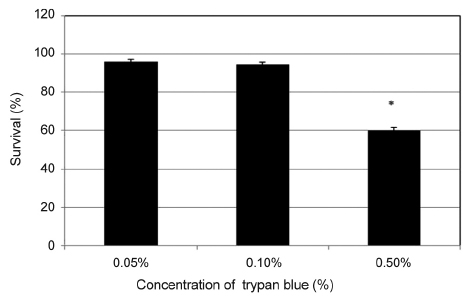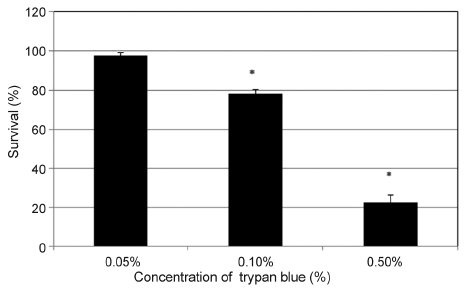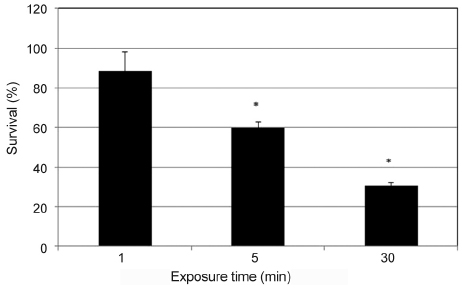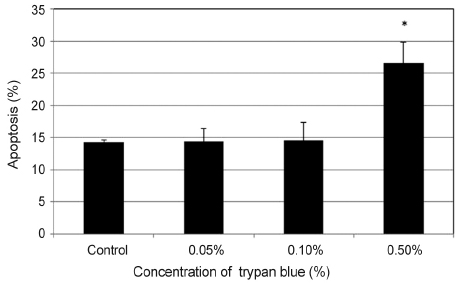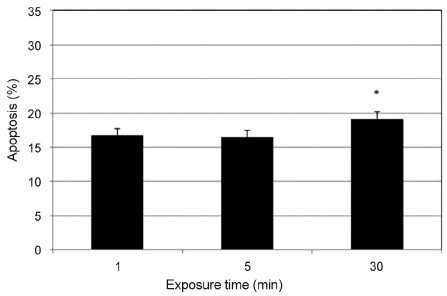J Korean Ophthalmol Soc.
2017 Mar;58(3):327-332. 10.3341/jkos.2017.58.3.327.
Effect of Trypan Blue on the Survival of Cultured Trabecular Meshwork Cells
- Affiliations
-
- 1Department of Ophthalmology, Catholic University of Daegu School of Medicine, Daegu, Korea. jwkim@cu.ac.kr
- KMID: 2371914
- DOI: http://doi.org/10.3341/jkos.2017.58.3.327
Abstract
- PURPOSE
To evaluate the effects of trypan blue (TB) on the survival of cultured human trabecular meshwork cells (HTMCs).
METHODS
Primarily cultured HTMCs were exposed to 0.05, 0.10 or 0.50% TB for 1, 5 or 30 min. Cellular survival was assessed using the MTT assay and degree of apoptosis was analyzed with flow cytometry using annexin-V/propidium iodide double staining.
RESULTS
Long-term exposure or high concentration of TB decreased the survival of HTMCs (p < 0.05). In flow cytometric analysis, exposure to 0.50% TB for 30 min increased the degree of apoptosis (p < 0.05). Commercial TB decreased cell survival after exposure for 5 min and increased the degree of apoptosis after exposure for 30 min (p < 0.05).
CONCLUSIONS
TB may cause cellular damage of cultured HTMCs and apoptosis could be the underlying mechanism. In TB-assisted cataract surgery, TB should be used for the shortest time possible and removed completely.
MeSH Terms
Figure
Reference
-
1. Badaro E, Novais EA, Penha FM, et al. Vital dyes in ophthalmology: a chemical perspective. Curr Eye Res. 2014; 39:649–658.2. Melles GR, de Waard PW, Pameyer JH, et al. Trypan blue capsule staining to visualize the capsulorhexis in cataract surgery. J Cataract Refract Surg. 1999; 25:7–9.3. Jhanji V, Chan E, Das S, et al. Trypan blue dye for anterior segment surgeries. Eye (Lond). 2011; 25:1113–1120.4. Chang YS, Tseng SY, Tseng SH. Comparison of dyes for cataract surgery. Part 2: efficacy of capsule staining in a rabbit model. J Cataract Refract Surg. 2005; 31:799–804.5. van Dooren BT, Beekhuis WH, Pels E. Biocompatibility of trypan blue with human corneal cells. Arch Ophthalmol. 2004; 122:736–742.6. Melendez RF, Kumar N, Maswadi SM, et al. Photodynamic actions of indocyanine green and trypan blue on human lens epithelial cells in vitro. Am J Ophthalmol. 2005; 140:132–134.7. Nanavaty MA, Johar K, Sivasankaran MA, et al. Effect of trypan blue staining on the density and viability of lens epithelial cells in white cataract. J Cataract Refract Surg. 2006; 32:1483–1488.8. Alvarado J, Murphy C, Juster R. Trabecular meshwork cellularity in primary open-angle glaucoma and nonglaucomatous normals. Ophthalmology. 1984; 91:564–579.9. Rohen JW, Lütjen-Drecoll E, Flügel C, et al. Ultrastructure of the trabecular meshwork in untreated cases of primary open-angle glaucoma (POAG). Exp Eye Res. 1993; 56:683–692.10. Dada VK, Sharma N, Sudan R, et al. Anterior capsule staining for capsulorhexis in cases of white cataract: comparative clinical study. J Cataract Refract Surg. 2004; 30:326–333.11. Chung CF, Liang CC, Lai JS, et al. Safety of trypan blue 1% and indocyanine green 0.5% in assisting visualization of anterior capsule during phacoemulsification in mature cataract. J Cataract Refract Surg. 2005; 31:938–942.12. van Dooren BT, de Waard PW, Poort-van Nouhuys H, et al. Corneal endothelial cell density after trypan blue capsule staining in cataract surgery. J Cataract Refract Surg. 2002; 28:574–575.13. Dick HB, Aliyeva SE, Hengerer F. Effect of trypan blue on the elasticity of the human anterior lens capsule. J Cataract Refract Surg. 2008; 34:1367–1373.14. Mosmann T. Rapid colorimetric assay for cellular growth and survival: application to proliferation and cytotoxicity assays. J Immunol Methods. 1983; 65:55–63.15. Polansky JR, Weinreb RN, Baxter JD, Alvarado J. Human trabecular cells. I. Establishment in tissue culture and growth characteristics. Invest Ophthalmol Vis Sci. 1979; 18:1043–1049.16. Alvarado JA, Wood I, Polansky JR. Human trabecular cells. II. Growth pattern and ultrastructural characteristics. Invest Ophthalmol Vis Sci. 1982; 23:464–478.17. Veckeneer M, van Overdam K, Monzer J, et al. Ocular toxicity study of trypan blue injected into the vitreous cavity of rabbit eyes. Graefes Arch Clin Exp Ophthalmol. 2001; 239:698–704.18. Tsaousis KT, Kopsachilis N, Tsinopoulos IT, et al. Time-dependent morphological alterations and viability of cultured human trabecular cells after exposure to Trypan blue. Clin Exp Ophthalmol. 2013; 41:484–490.19. Rezai KA, Farrokh-Siar L, Gasyna EM, Ernest JT. Trypan blue induces apoptosis in human retinal pigment epithelial cells. Am J Ophthalmol. 2004; 138:492–495.20. Jardeleza MS, Daly MK, Kaufman JD, et al. Effect of trypan blue staining on the elastic modulus of anterior lens capsules of diabetic and nondiabetic patients. J Cataract Refract Surg. 2009; 35:318–323.21. Raghunathan VK, Morgan JT, Park SA, et al. Dexamethasone stiffens trabecular meshwork, trabecular meshwork cells, and matrix. Invest Ophthalmol Vis Sci. 2015; 56:4447–4459.22. Healey PR, Crowston JG. Trypan blue identifies antimetabolite treatment area in trabeculectomy. Br J Ophthalmol. 2005; 89:1152–1156.23. Agrawal S, Agrawal J, Agrawal TP. Use of trypan blue to confirm the patency of filtering surgery. J Cataract Refract Surg. 2005; 31:235–237.24. Dada T, Muralidhar R, Sethi HS. Staining of filtering bleb with trypan blue during phacoemulsification. Eye (Lond). 2006; 20:858–859.25. Grigg J, Jang JD, Fung AT, et al. Trypan blue to assess Baerveldt tube patency after repair of its obstruction. J Glaucoma. 2011; 20:571–572.26. Gouws P, Merriman M, Goethals S, et al. Cystoid macular oedema with trypan blue use. Br J Ophthalmol. 2004; 88:1348–1349.27. Buzard K, Zhang JR, Thumann G, et al. Two cases of toxic anterior segment syndrome from generic trypan blue. J Cataract Refract Surg. 2010; 36:2195–2199.
- Full Text Links
- Actions
-
Cited
- CITED
-
- Close
- Share
- Similar articles
-
- Effect of beta-adrenergics on the Survival and Production of Nitric Oxide in the Cultured Trabecular Meshwork Cells
- Effect of Mitomycin C on the Proliferation and Nitric Oxide Production in the Cultured Trabecular Meshwork Cells
- Distribution of proteoglycans in the human trabecular meshwork: histochemical electron microscopic findings with cuprolinic blue
- Effect of High Glucose on the Production of Reactive Oxygen Species in Trabecular Meshwork Cells
- Effect of Erythropoietin on the Production of Nitric Oxide in Trabecular Meshwork Cells

